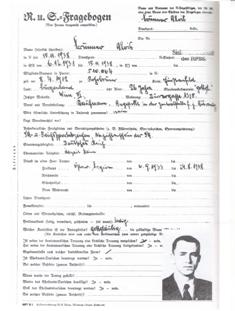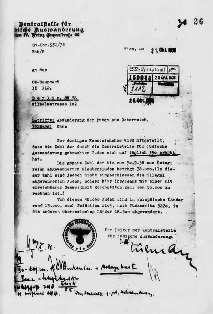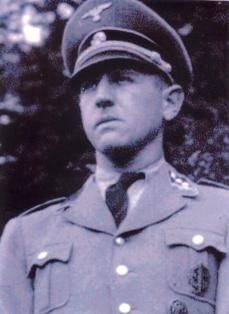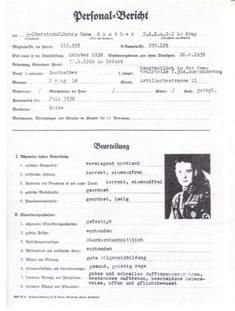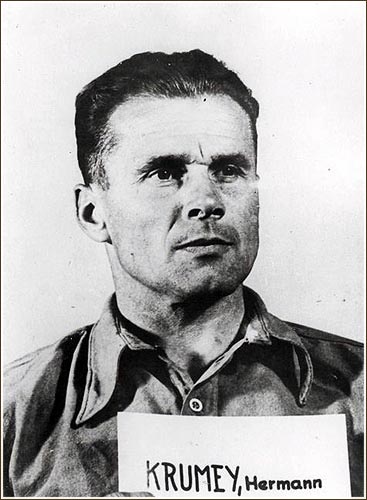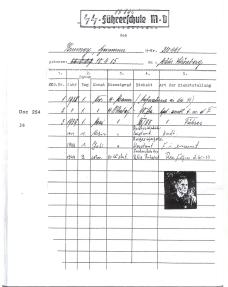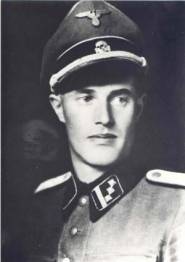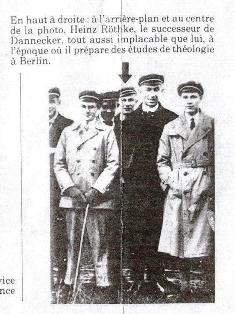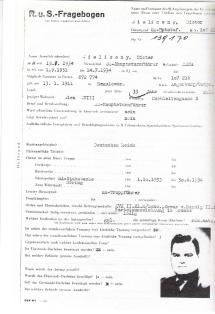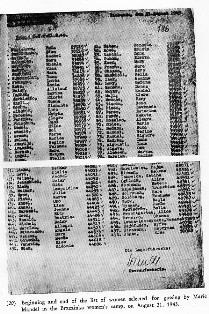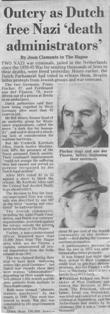Holocaust Education & Archive Research Team |
|
Holocaust Prelude Early Nazi Leaders Nazi Propaganda Nazi Racial Laws Sinti & Roma Kristallnacht The SS SS Leadership Wannsee
Prelude Articles Image Galleries | |||||||
The Eichmann Henchmen “The Squalid Engineers of Human Misery”
Alois Brunner
SS- Hauptsturmfuhrer
Alois Brunner was born on the 8 April 1912 in Rohrbrunn, Austria. He joined the Nazi Party in 1931 and the SS in 1938. Brunner worked as Eichmann’s secretary in Vienna and was in charge of the registration and deportation of Austrian Jews to the East.
One of those who witnessed the deportations from the Reich was Gertrude Schneider, who was deported on 6 February from Vienna. The transport commander was Alois Brunner, one of whose charges during the long journey was the Viennese financier, Siegmund Bosel. During the second night of the train journey, Brunner chained Bosel, still in his pyjamas, to the floor of the first wagon and berated him for having been a profiteer.
The old man repeatedly asked for mercy, he was very ill, and it was bitterly cold. Finally, Brunner wearied of the game and shot him. Afterwards Brunner walked into the second wagon and asked whether anyone had heard anything. “After being assured that no one had,” Gertrude Schneider later recalled, “he seemed satisfied and left.”
The Viennese transport reached Riga on 10 February. Brunner witnessed a transport of Jews leaving from the Aspangbahnhof Vienna to the death camp at Sobibor in Poland on 14 June 1942.
He was highly regarded by Eichmann and Brunner worked in Berlin from late 1942 to January 1943, deporting Jews from the Reich’s capital. The following month saw Brunner in Salonika, Greece, from where the Jews were deported to Auschwitz and Treblinka in Poland.
From July 1943 until August 1944, Brunner served in France, where he commanded the Drancy Internment Camp, near Paris. Brunner was then transferred for the deportation of Slovakian Jews from the Sered labour camp.
Theo Dannecker
SS- Hauptsturmfuhrer Theo Dannecker was in charge of the deportations of Jews from France in 1942, Bulgaria in 1943, and Italy during 1944. Dannecker was a young Bavarian lawyer from Munich who became one of Adolf’ Eichmann’s indispensable agents in the implementation of the “Final Solution.”
Sent to Paris in September 1940 by Eichmann’s Bureau IV B4, the branch of the RSHA in Berlin devoted to “Jewish” matters. Dannecker headed its French bureau and Judenreferat (Jewish section) receiving his orders directly from Eichmann.
As the “Jewish expert” of the Gestapo and Eichmann’s deputy with the Paris Sipo- SD it was SS- Hauptsturmfuhrer Dannecker claimed the credit for being the first to propose continuous Jewish deportations from France to the East.
He was constantly prodding the Vichy authorities to take more active anti-semitic measures , Xavier Vallat, the first French Commissioner for Jewish Questions who clashed with him over the long –range German policy on the Jews in France, described Dannecker as “a fanatical Nazi who went into a trance every time the word Jew was mentioned.”
Dannecker was recalled to Berlin in October 1942 for abusing his independence and in January 1943 was transferred to Eichmann’s office in Sofia, Bulgaria, where he continued to supervise deportations of Jews.
Posted to Verona in October 1943 and to Hungary in the summer of 1944, in October 1944 he was appointed Jewish Commissary for Italy. He remained with the Eichmann commando until the end of the war, Dannecker committed suicide in an American prison camp in Bad Tolz on 10 December 1945.
Ferdinand aus der Funten
SS – Hauptsturmfuhrer
Born 17 December 1909. irected Eichmann’s branch office in Amsterdam, Holland and arranged the deportations of 1942-1944. A zealous and efficient administrator was sentenced to death at his trial in The Hague on 27 December 1949, but this was commuted to life imprisonment in 1951, at his trial he said “he was following orders like good Germans.” He was released from Breda prison in 1989
Hans Gunther
SS- Sturmbannfuhrer Born 22 August 1910 in Erfurt, he served in the Central Office for Jewish Emigration in Vienna and Prague. His brother Rolf served in the same department. Gunther was killed by Czech partisans on 5 May 1945.
Rolf Gunther
SS – Sturmbannfuhrer Born 8 J anuary 1913 in Erfurt, he was Eichmann’s permanent deputy in the RSHA. He worked, as did his brother, Hans, in the Central Office for Jewish Emigration in Vienna.
Gunther joined the SA in 1929, when only sixteen years old, Eichmann considered Rolf Gunther as the “personification of toughness.”
He was responsible for sending Kurt Gerstein on his mission to the Belzec death camp to test whether Zyklon B could be used as a killing agent, rather than carbon monoxide. Gunther committed suicide in an American internment camp at Ebensee, during the summer of 1945.
Otto Hunsche
SS-Hauptsturmfuhrer Otto Hunsche was a member of Eichmann’s office who was active in Hungary in 1944. He was arrested in Frankfurt in 1957, but released in 1959. Arrested again during November 1960 and charged with 1,200 murders by the Frankfurt Schwurgericht in April 1962. He was convicted in February 1965, when it was deemed he had already served his sentence and was therefore released.
Hermann Krumey
SS- Sturmbannfuhrer Born 1905 in Mährisch-Schönberg (Moravia), he joined the SS after the Anschluss. In November 1939 he was called up by the SS Head Office for Personnel, and was immediately dispatched to Poznan, where he was in charge of the programme to forcibly remove Poles from the Warthe District.
In spring 1940, Krumey was appointed head of a branch office in Lodz (Litzmannstadt) of the Central Office for Migration (Umwandererzentralstelle Litzmannstadt), which controlled the deportation of Poles to the Generalgouvernement. In summer 1941, Krumey spent some time in Croatia as part of the programme to concentrate Croatian Jews in camps. Krumey had contact with Eichmann’s department during the resettlement of the Warthe District, and in spring 1944 accompanied Eichmann to Budapest, where Krumey served as a member of the group organizing the mass deportation of Hungarian Jews to Auschwitz. Krumey was arrested by the Allies in Italy in 1945, but as the result of an affidavit submitted on his behalf by Rezso (Rudolf) Kasztner, the Zionist leader involved in negotiations with the SS in Hungary in 1944, was not prosecuted and was released in 1948. Active in local Government at Korbach (Hessen / Germany), Krumey was arrested in 1957, 1958 and 1960, finally remaining in custody until 1965. Sentenced by the Frankfurt Schwurgericht in that year to five years imprisonment, he was deemed to have already served his sentence, and was immediately released.
Following an appeal by the prosecution, a new trial was ordered and held in 1968 - 1969, as a result of which Krumey was sentenced to life imprisonment on 29 August 1969. The sentence was upheld on appeal in 1973.
Franz Novak SS-Hauptsturmführer Born 10 January 1913 in Wolfsberg (Kärnten / Austria). The son of a locomotive driver, in 1929 he joined the "Hitler Youth", the Nazi party, and SA in 1933. In 1934 following the assassination of Dollfuss, a crime in which he was involved, he fled to Germany, and in 1938 joined the SS and SD. Following the Anschluss, Novak returned to Austria, working in the Central Office for Jewish Emigration, first in Vienna, then Berlin, and finally in Prague. Novak was Eichmann’s railroad ant timetable expert and occupied a liaison role with the Ministry of Transport. He worked with Eichmann on the deportation of Hungarian Jews in 1944 to Auschwitz.
After an appeal, a retrial was ordered in 1966, as a result of which Novak was acquitted. Two years later the Supreme Court revoked the judgement for formal reasons and ordered a further trial. This time a unanimous verdict of guilty was passed in 1969, resulting in a sentence of nine year’s imprisonment.
Novak's attorney pleaded nullity and Novak was not re-arrested. After the third repeal by the Supreme Court, a verdict of guilty was passed again by the court in 1972. The jury explicitly denied that Novak acted under obligation to obey binding orders.
He was convicted, however, not for murder, but for committing "public violence under aggravating circumstances" by transporting human beings without providing sufficient water, food and toilet facilities. Seven out of eight members of the jury did not hold him guilty of being an "accessory to murder" and conceded to the limitation of the crime.
As a result Novak was jailed for seven years. The Supreme Court prohibited any further appeals and pleas of nullity.
Dr Heinz Rothke
SS- Hauptsturmfuhrer Born 1913. Theology student then Berlin Lawyer who took over Eichmann’s Paris branch of Jewish Affairs in July 1942 from Theodor Dannecker, was responsible for the “La Grand Rafle” carried out on the 16 – 17 July 1942 in Paris. Lived in West Germany after the war, resumed his career as a Lawyer, Rothke died in 1968.
Dieter Wisliceny
SS – Hauptsturmfuhrer Dieter Wisliceny was born on the 13 January 1911 in Regulowken – East Prussia, the son of a landowner. Wisliceny was a failed theology student who had worked briefly as a clerk in a construction firm, and was unemployed when he became a member of the NSDAP in 1931.
In 1934 he joined the SS and in June of the same year entered the SD – at one time Wisliceny was Eichmann’s superior in the SS, he became one his “Jewish experts” serving as an official in the Reich Central Office of Jewish Emigration.
From September 1940 he was attached to the German delegation in Bratislava as an advisor on Jewish questions to the Slovak government. Wisliceny, who belonged to the more educated stratum of the SS and was more concerned with money than a career, acquired a reputation in Slovakia for accepting bribes.
Less fanatical than Eichmann, he accepted 50,000 dollars from the Jewish relief committee in Bratislava for delaying deportations from Slovakia in 1942. In 1943-4 Wisliceny was sent to Greece, where he headed the Sonderkommando fur Judenangelegenheiten, in Salonika, introducing the Jewish Star and preparing deportations, along with Alois Brunner. Three ghettos were established, one the “Baron Hirsch” quarter was enclosed.
Wisliceny and his associates established themselves in villas, formerly owned by Jews in the Hodos Velissariou and on the 15 March 1943, forty box cars left for Auschwitz. The next transport to leave “Baron Hirsch” was directed to the death camp at Treblinka, arriving there on 26 March 1943.
In March 1944 he was called to Budapest to join Eichmann’s special operations unit. Wisliceny liked to be addressed as “Baron” by the Hungarian Jews, was actively involved in the bargaining for Jewish lives, but the instalments paid to him did not prevent the deportations to Auschwitz.
Wisliceny was arrested on the 12 May 1945 near Altaussee, Austria. At the Nuremberg War Crimes Trial Wisliceny was a witness for the prosecution and he gave shocking details about the “Final Solution.”
Wisliceny claimed that in late April or early May 1942, Eichmann had shown him an order signed by Himmler which, on Hitler’s specific authority, designated Heydrich to immediately begin the “final disposition of the Jewish question.”
It was to him that Eichmann allegedly said that he would “leap into his grave laughing”, because the feeling that he had five million people on his conscience was to him “a source of extraordinary satisfaction.”
Wisliceny was eventually extradited to Czeechoslovakia standing trial in Bratislava where he was executed on 27 February 1948 for complicity in mass murder.
Wilhelm Zopf
SS – Hauptsturmfuhrer Born 11 March 1908. Head of Eichmann’s Jewish Office in The Hague, Holland. Not charged till June 1963. Tried in Bonn then West Germany in 1967. Sentenced to seven years imprisonment
Sources: The Final Solution by Gerald Reitlinger, published by Vallentine, Mitchell and Co Ltd 1953 Die Eichmann- Manner by Hans Safrian, published by Europaverlag – Wien-Zurich 1993 Wiener Library Holocaust Historical Society
Copyright Chris Webb H.E.A.R.T 2007
|
